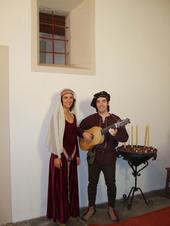ENGLISH:
The Cantus ANonimus are focused mainly on portuguese renaissance music. Although we are a recent group we have participated in numerous festivals, medieval and renaissance fairs, recitals, and in all sort of events. The group is formed by Joana Neto (Voice and percussion) and Manuel Tavares (Vihuela made by the portuguese lhutier Carlos Abreu). The first CD of the group will be on the market in the summer of 2008. Our repertoire is taken from collections of musical works that in Portuguese are called "Cancioneiros" a term that is taken from the word song ("canção"). This "Cancioneiros" are precious collections of music and lyrics that go back to the XVI century, the golden era of Portugal, that was at that time one of the most powerful country's of Europe because of his pioneer role in the discovery's (for example, it was the first European country to discover the maritime way to India, land of spices so appreciated in Europe on that time). Its is only normal that the cultural environment of Portugal was back them unusual rich an varied for such a small and distant country from the great centres of European culture. The Portuguese tradition of profane and sacred music was already solid and respected but this economic "boom" attracted all sorts of musicians from outside that travelled to the country to get a place on a court that was full of gold and generous with good musicians. This created an atmosphere that was stimulating for Portuguese and foreigner musicians and so numerous compositions ware born, some of them in renaissance Portuguese (almost similar to actual Portuguese only with obvious differences in writing and terms), other in Castilian that was them taking the role that the Provençal and Galician-Portuguese had once before during medieval times in the courts of the Iberian Peninsula and south of France, very much the same phenomenon that occurs with the English language today only on an different and wider level (the Galician-Portuguese also known as galego-português or galaico-português in Portuguese and as galego-portugués or galaico-portugués in Galician was a West Iberian Romance language spoken in the Middle Ages, in the northwest area of the Iberian Peninsula. It was spoken at first from the Bay of Biscay to the Douro River, but it expanded South with the Christian Reconquest. It is the common ancestor of modern Galician and Portuguese. The language was used for literary purposes from the final years of the 12th century until roughly the middle of the 14th century in what are now Spain and Portugal and was, almost without exception, the only language used for the composition of lyric poetry)
PORTUGUÊS:
Os Cantus Anonimus movem-se no campo da música renascentista portuguesa. Apesar de serem um agrupamento recente já participaram em inúmeras feiras medievais, recitais, festivais de música e nos mais variados eventos como em inaugurações, lançamento de livros, exposições, etc. são formados por Joana Neto (voz e percussão) e Manuel Tavares (vihuela, feita pelo lhutier português Carlos Abreu).
O repertório está assente nos Cancioneiros de Elvas, Cancioneiro de Belém, Cancioneiro da Biblioteca Nacional, Cancioneiro da Biblioteca de Paris.
Está previsto para o ano de 2009 o lançamento do primeiro CD dos Cantus Anonimus.
